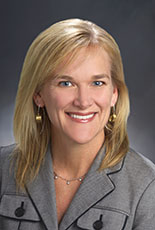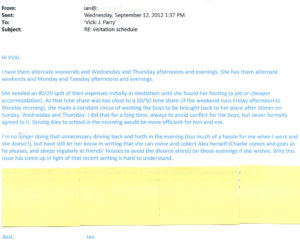
Why did I engage my divorce lawyer, Vicki Parry?
Well, you’ve heard the old joke about the lawyer who represented himself? He had an idiot for a client!
And I am NOT a divorce lawyer. Nor do I ever go to court for clients.
Vicki came very well recommended. “She’s a real terrier,” announced a colleague, “and if you don’t hire her your ex will! She’s THE family lawyer in the County.” Gary Britton, a well-respected Santa Cruz lawyer and grandfather of my sons Nick and Tom, confirmed her recommendation.
I felt safe, making the reasonable assumption that Vicki was on my side.
Ignorance is bliss, and I remained comfortable, although less so as time went on, until the trial itself, which took place on October 23, 2012.
Unfortunately, by that time, a lot of the damage had already been done, much of it under Vicki’s supposedly watchful eyes.
Pre-trial: the wrong judge
For example, the divorce took over two years to come to trial. I wanted to move forward as quickly as possible, but agreed to mediate while we waited and agreed to the mediator proposed by Vicki, Pascha Rose. The mediation ground to a halt after March 2011, when Marie-Helene, my parasitic ex-wife, refused to contribute to its cost. But Vicki told the court that we were still in settlement discussions until July 2012, delaying the trial. Not true.
I didn’t know it yet, but I was already screwed.
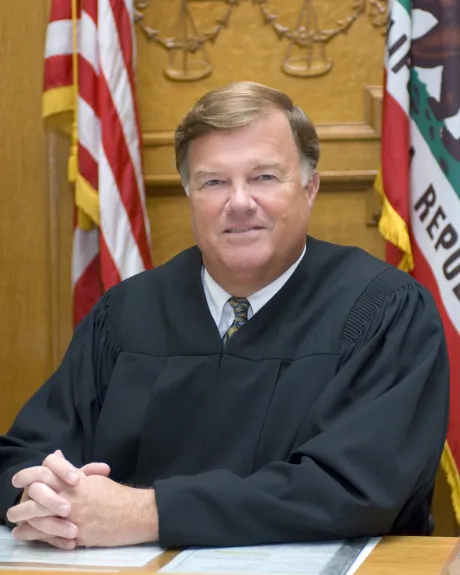
Why? Because Vicki had waited until Judge Jeff Almquist moved from his position as Presiding Judge in Santa Cruz to the Family Law Court in Watsonville. Vicki had not only added a year to the period when I paid a ton of “temporary” support, but she had saddled me with a known francophile judge who regularly vacationed in France.
Marie-Helene, my French ex-wife, must have been delighted! I did not know that he was a known francophile, but Vicki must have known – Judge Almquist was quite public about it in his courtroom.
Why did Vicki wait for a year until he was ensconced in Family Court before saying that we were ready for trial? Was she too busy to protect my interests?
Or was Vicki advancing Marie-Helene’s interests?
The latter theory is supported by her failure to use the “peremptory challenge” that I was entitled to under California law (but did not know about at the time). She could have used that challenge to remove this francophile judge, who obviously risked favoring Marie-Helene. If Vicki had been simply too busy to handle a trial of this case, she would have made the challenge. You don’t even have to justify such a challenge: it’s granted if you make it. But you have to make it at the beginning of the case. She didn’t, I was screwed, and Marie-Helene made out like a bandit.
I finally discovered this challenge myself, over six years later, when Judge Almquist was finally reversed by the Sixth District Court of Appeal for one of his unjustifiable holdings on spousal support. That reversal gave me the right to make the challenge myself, which I duly did, with a big sigh of relief. He tried to avoid it, of course, but failed, thanks to my lawyer nephew Antony Nash.
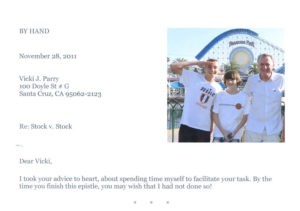
Pre-trial: Discovery
Then there is what is called discovery, the part of the procedure where you are entitled to make the other party show his or her hand, in a divorce mostly hidden assets. Marie-Helene’s lawyer did so with me, sending me written questions and interrogating me in person, but derived very little benefit from it: my limited assets were all visible and above board.
While Vicki did send Marie-Helene written questions, she did not interrogate her in person or otherwise follow up on the very real French assets her answers revealed or the income that they generated for her. In fact, she spent the weeks before the trial interrogating me again and again, and not Marie-Helene! This failure caused real harm.
Vicki, of course, knew discovery law inside out: it had been a mainstay of her career for about 30 years!

Although each party retains her or his separate property when community property is split between the spouses, the income from separate property impacts the case going forward.
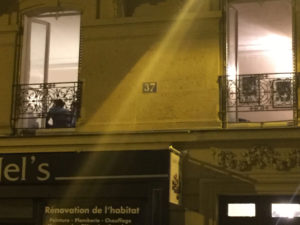
Most importantly, that income counts in the calculation of spousal support: it even counts in awards of attorneys fees! The wealthier spouse in terms of assets should not be able to claim poverty simply by virtue of not working. Assets generate income which factors into just and fair calculations.
Now Marie-Helene had substantially more separate property assets that I have. I don’t know all of them, but I do know that she and her brother still own two apartments in a desirable area of Paris, and that these apartments are easily rented out. There is definitely income there, although Marie-Helene claimed that it belonged to her 96 year-old father.
It is all of her French assets that Vicki should have sought to clarify and expose in discovery, especially those that I could not identify by myself.
Vicki did almost nothing to put Marie-Helene’s relative wealth and the income it generated before the court, even though I informed her about it and how to locate it as much as I could.

Trial: How Judge Jeff Almquist revealed his bias, and Vicki ignored it
During the trial, the judge smiled broadly each time he shared with Marie-Helene that he would soon be vacationing in Paris. He added on at least two occasions that he would greatly appreciate any referrals that she could offer him to good restaurants there. Marie-Helene did not respond either time.
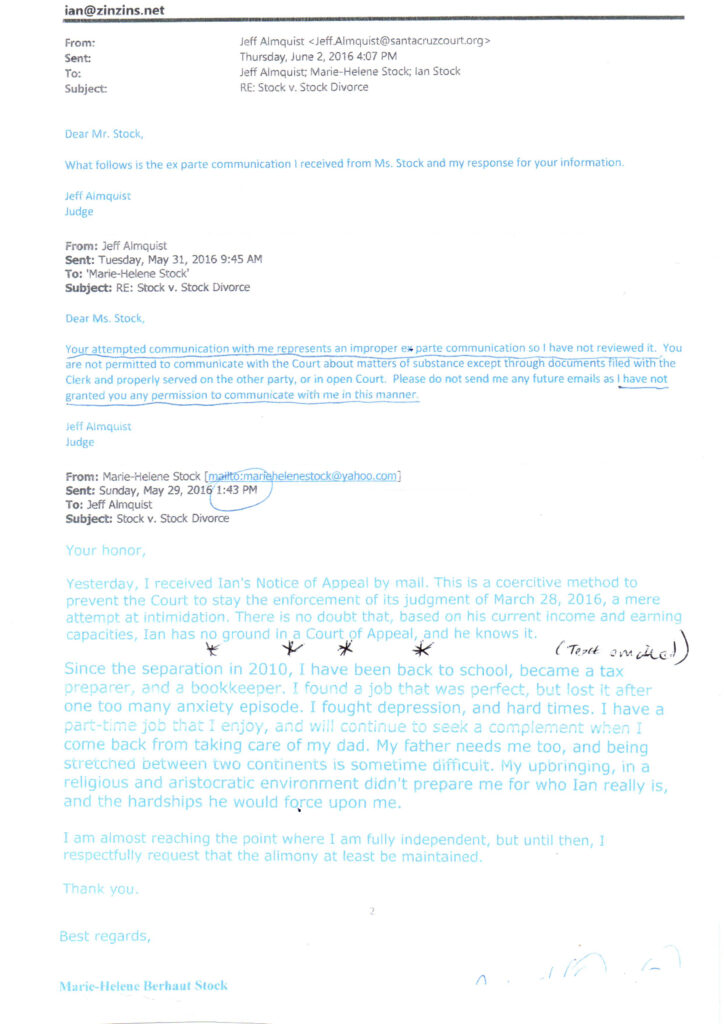
Toward the end of the hearing, Judge Almquist told her that “after this is all done, I will give you a call to get those referrals:” those very words or something similar.
You don’t need to be a lawyer to know that Judge Almquist was way out of line here. I knew it, just as I knew that his evident bias meant that I was screwed.
I looked over at Vicki, my well paid support person, each time the judge had a “friendly” interaction with my ex-wife, and each time she shuffled her papers, concentrated hard somewhere else, and ignored me. She knew that what was happening was very wrong, and did nothing about it.
In those interactions alone, you can tell what the basic conclusion of this divorce was going to be, on just about every level. And, as I detail below, it was. My fate was sealed.
I don’t know if the judge did call Marie-Helene after the trial, or if they had other “friendly” interactions out of the public eye. I do know that she wrote him in 2026 a personal email pleading with him to grant more spousal support, because he forwarded me that email. Was that the only one that she sent him?
This whole proceeding stank.
Trial: Spousal Support
At trial, my key concerns were typical: I wanted (1) the Court to reduce the $3,500 per month in “temporary” alimony that I was paying (on top of child support of $3675); (2) to look after the boys about half the time; and (3) to split fairly our accumulated property. There was not a lot of that, but enough to make a difference to my retirement.
rFirst, spousal support. By ignoring Marie-Helene’s substantial separate property and not bringing it before the Court right at the beginning, Vicki allowed my income (Marie-Helene was barely working) to become the sole factor taken into account in setting spousal support. Now I was really screwed!
In his February 2013 Decision the Judge fixed “permanent” spousal support initially at $4,000 per month, $500 higher than the “temporary” spousal support that had been set in the mediation. “Temporary” spousal support is typically higher than “permanent” to allow a non-working spouse to begin to make a living again.
Of course, Vicki failed to focus on this in her pleadings on my behalf, enabling Judge Almquist to do the same and increase spousal support twice in one decision!
The Judge ordered an increase in spousal support (from $4,000 to $5,000) when Charlie turned 18 and his mom was no longer entitled to child support for him. Good grief!
Judge Almquist apparently wanted to assure Marie-Helene that she would benefit from much the same monthly income from me for years, whether or not she was supporting our children. And she did. Even though that is not the way that it is supposed to work.

Then, in March 2013, after we received the court’s draft Decision, Vicki fired me. I had only a few days to respond to the Court’s draft decision, perhaps change it, and she left me in the lurch. Thanks Vicki! She must have realized that the Judge had gone too far. Rather than helping me face that, she threw me under the bus.
In June of 2014, after Vicki was long gone, I ran into a divorce lawyer at a party and asked her what to do about Marie-Hélène’s not really working four years after I moved out.
A less experienced family lawyer than Vicki, the other lawyer immediately responded that I should request a “vocational assessment” for Marie-Hélène. This assessment involves an impartial expert examining a person’s work experience, qualifications and intangibles to arrive at an expert opinion on what she can earn.
As soon as I heard this, I loved it. I worked for almost six years in Paris with Marie-Hélène in a bilingual law firm (before we dated), and she aced everything she did there. I know that she can earn if she wants to.
Why had Vicki not recommended such an assessment as soon as it became clear that Marie-Helene did not intend to earn any real money? Like I said, whose side was she on?
When a vocational assessment was finally conducted in our case, the expert opined in 2015 that Marie-Hélène’s earning capacity was easily and quickly $35 – 45,000, and would be significantly higher in three or more years. By not requesting such an assessment to me at the start, Vicki delayed for years the court’s imputing income to Marie-Helene that would have reduced my alimony and child support obligations. That’s the law in California: you can’t refuse to work and still claim alimony and child support as if you were unable to.
Of course, Judge Almquist then said in court that he would impute about $40,000 p.a. in income for Marie-Helene, but did not do so in his order. When I queried this omission in a letter to the Court, the clerk explained that the judge had simply been “discussing” such imputation!
Are you beginning to see why I felt for years that I could not win?
Trial: Child Custody
These important failures on alimony were nothing compared to how Vicki mishandled child custody at the trial and before. Again, the failures look deliberate to me, as if they had a purpose.
Child custody had been out of sync since the mediation. Our mediator, Pascha Rose, had obtained my agreement initially to pay Marie-Hélène child support based on their mother looking after the boys 80% of the time. I didn’t know it then, but that’s the percentage used when the children visit the parent whose home they don’t live in one weekend in two, but otherwise stay at home.
In our case, the schedule involved Marie-Helene looking after the boys only 55-60% of the time, and me the other 40-45%. Perhaps in order to justify her 80/20 allocation of child support, Pascha did not have us put the custody schedule in writing, even though this schedule existed and was being practiced.
When the mediation unraveled, the boys were stuck with constant debates between the parents about silly details that should have been included in the mediated custody schedule. These debates started in late 2010, and continued through the trial and beyond until I had them fixed in mid 2014.

During the trial, the real days and times of the custody schedule that we were practicing, its nitty-gritty, were not raised accurately, even though I had summarized them for Vicki in an email before the trial, both what was agreed and what was subject to debate because of Pascha’s failure to put it on paper.
That email is below on the right. In terms of expense for each parent, the debate was around 2-1/2 breakfasts per week. How much is that in percentage terms?
The other big question here is why this was discussed at trial at all. Here is Family Code Section 3170 (a): “If it appears . . . that custody, visitation, or both are contested, the court shall set the contested issues for mediation.”
This means that if there is a debate about child custody, the law requires that the judge refer the debate to an impartial mediator who has psychological training and is experienced in looking after the children of divorce. This expert mediator then duly determines the custody schedule in the best interests of the children.
Vicki did not ask that our custody dispute be referred at trial to the custody mediator, and Judge Almquist did not order such a mediation despite the debate at trial about custody.
Vicki Parry, John Hannon, Marie-Hélène’s lawyer,and Judge Jeff Almquist enacted in court what I can only describe as a charade, in which they debated abstract percentages of time that the boys were alleged to spend with each parent. Vicki’s post-trial brief gives some sense of this charade:
The Court is confronted with the fact there is a difference of opinion between these parents as to how much time Charlie and Alex spend with their dad. Actually, the dispute regarding timeshare seems to be as to Charlie only. Marie-Helene testified Alex spends 20-25% of his time with his dad while she contended Charlie only spent about 5% of his time with his dad. Marie-Helene’s I&E states both boys spend 20% of their time with their dad. . . .
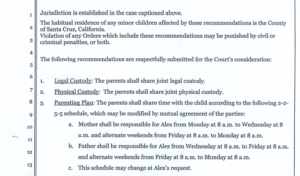
The problem with calculating Charlie’s timeshare is he is seventeen, has a car and spends time away from both of his parents. . .
Instead of doing what the law requires, all three of these professionals deliberately appear to have put on a show. I may have been the only lawyer in that family law courtroom who did not know what was going on.

Vicki should obviously have requested a custody mediation in our case, and the Court should obviously have ordered one. Their failure to do so was not simply ignorance of the law, which was impossible in light of their many years of experience. Vicki even refused my pre-trial suggestion that she ask for professional input on what would be best for the boys.
When I finally requested custody mediation during the spring of 2014, after discovering it for myself, its refreshingly prompt result was that custody was split 50/50 as of July 2014.
That’s how it should have been in late 2010, if Pascha had been doing her job properly, and in late 2012, if Vicki and Judge Almquist had been doing their job properly.
Why did both Pascha and Vicki fudge child custody? Why did the Court let them? The most direct consequence was that the boys were subjected to constant debates between their parents about the two and a half more breakfasts a week that their mother wanted to feed them to justify her claimed 80% of custody.
Marie-Helene’s debating this so much tells you why she did so: it involved money. Underlying this fudged child custody procedure was child support. The State has attempted to ensure that this is calculated fairly, in accordance with software prescribed by law.
But as in all software, garbage in equals garbage out.
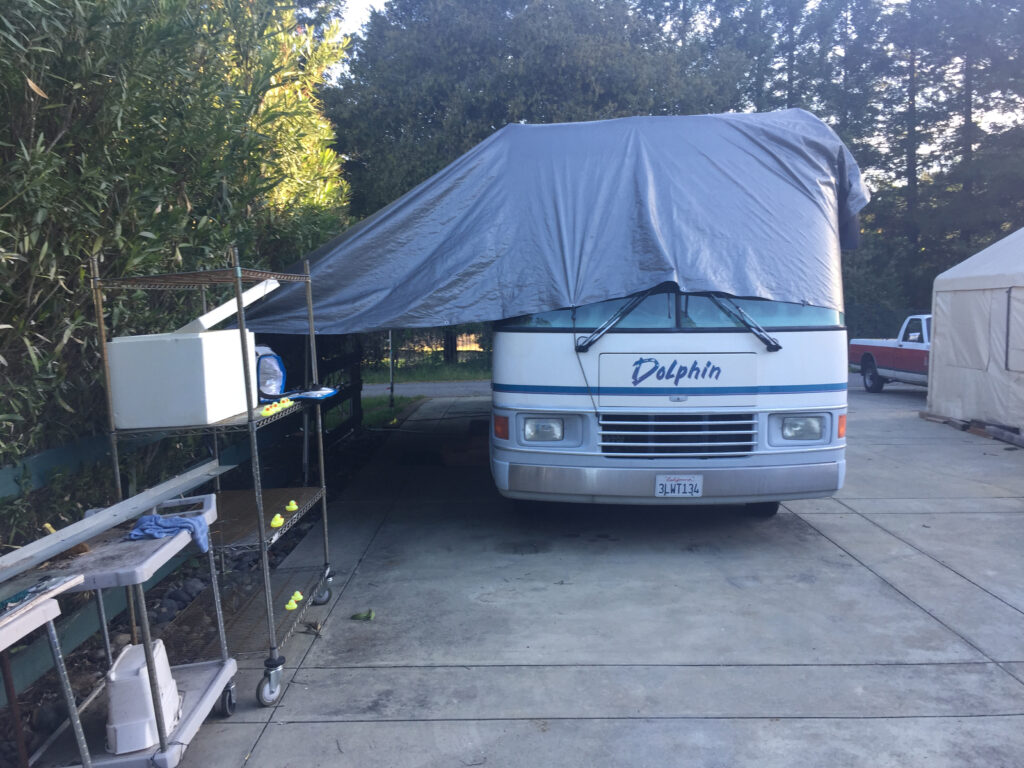
In this case, the garbage that went in had two components: first, the percentages of time the children were with each parent that I had mistakenly agreed to in the mediation, because I didn’t know the rules and trusted the mediator, and which were brought forward into the trial, because I trusted Vicki and neither she nor the Court demanded the custody mediation that the law required.
Second, the absence of any real income of Marie-Helene from her French properties or from working and of any imputed income despite her not working for two and a half years already. The boys were 17 and 15, and hardly needed their mother to look after them full time!
What came out were four plus years of my overpaying child support as if Marie-Helene earned or could earn almost nothing and as if the boys were only with me one weekend in two, while they were actually with me at least half the time overall (almost the whole time later on as Marie-Helene reduced her already limited expenditures on the boys). So not only did I pay a lot more per month than I should have to Marie-Helene (how much more: maybe $1,500 a month?) for all that time, I also paid independently more than my share of the boys’ expenses for them.
A double whammy which, yet again, I owe to Vicki, Pascha and Judge Almquist. While proud that I managed to cover almost all the boys’ expenses, in order to do so I was reduced to living in a rented RV for over a year starting in 2016. $600 per month, and the roof leaked!
Trial: Separation of Community Property
Of course, Vicki also did pretty much nothing to ensure a fair split of community property, meaning a 50/50 split. Have you noticed the dispiriting consistency about all this!

We had two major assets when we separated in April 2010, the equity in our home and about $42,000 in an RV. Vicki knew this since my 30-page 2011 letter to her. The only question had been whether a portion of the value in the RV could be claimed as my separate property. Of course, Vicki thought not. But about an identifiable half of its purchase price was easily visible as my separate property! To be safe, I’ll use her approach here.
Here’s the calculation which Vicki should have made for the Court (approximate numbers): total assets = [house equity of $775,000 (appraisal) less mortgage balance of $365,000], or $410,000, plus the RV value of [$53,000 (sale price) less loan amount ($11.000)], or $42,000. That’s a total of $452,000.
In an equitable distribution, I should have been paid $155,000, or the first 20% of the home’s value, equal to the percentage down payment on the home (which came out of mum’s estate and was my separate property), and we were to split the balance of $296,000, assuming that all it was community property. So my total should have been ($155,000 plus $148,000), or $303,000.
Needless to say, unlike Marie-Helene’s lawyer, Vicki did not make any calculations like this for the Court. She contented herself with informing the court about the house value and mortgage, completely forgetting the RV and any proposed allocation. When Judge Almquist was done, which of course took years, I received $140,000 and Marie-Helene kept the house, by then worth $900,000+ and subject to a mortgage of $300,000+.

Now that’s not quite an equitable distribution!
Judge Almquist proposed it during a judicial mediation session in which he voiced the opinion that it was reasonable, and suggested that disagreeing with him might be against my interests.
Vicki did address at length, because Marie-Helene’s lawyer had raised it, the asserted value of my business. I have practiced law alone since 2005, five years before we separated. One client brought in 60% of my revenue from 2006 through 2015. That looks much more like a job and a side hustle than a law firm having its own value independent of me.
You can lose a job, as I did when I lost that major client in late 2015. A solo practice isn’t a business that’s worth anything. Judge Almquist would have known this, having spent many years in private practice as a business and bankruptcy lawyer. But again – you’re no longer surprised, right? – he allowed himself to be led by Vicki’s failures to brief him correctly. Quite a combo, Vicki Parry and Judge Almquist!
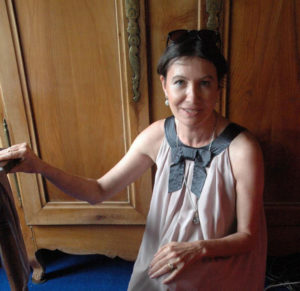
Vicki neither clarified the facts appropriately nor argued the law, which I had shown her! The law was clear that a solo practice has no real value. She then blamed me for not retaining the expensive business valuation expert whom she had recommended. That little combo of failure and blame, plus of course Judge Almquist’s going along with it, reduced by $70,000 my buyout for my share of the community property, our home and the RV. In percentage terms, I ended up with less than my original separate property downpayment on the home.
Results of Vicki’s failures
She also failed to order a court reporter, meaning that there was no transcript of the trial, making any appeal at that point such a laborious process that it was effectively precluded. Another little combo of failure and blame!
I did not finally appeal – doing so took a lot of time, and I was required to continue earning – until this proceeding became so visibly unbalanced that it threatened the boys’ college education.
Vicki failed to obtain a judgment of divorce at trial, and then did not tell me that the Court’s February 2013 decision omitted that judgment. Of course, any judge worth his salt is not going to “forget” to make a judgment!
Its absence here involved going back to Court four or five times before a judgment was finally issued, in October 2014. Twenty months!

It is fair to say that Vicki Parry, assisted by Pascha Rose and Judge Jeff Almquist, screwed up pretty much every material aspect of representing my interests in the divorce.
But how does a competent lawyer with such a great reputation screw up so badly?
To my mind, it has to have been deliberate. Remember, she’s been practicing family law for 30 odd years. Maybe a couple of screw ups could have been inadvertent, but not systematic failure on just about every important issue.
I have no idea why she would do this, except for the obvious: she wanted to help Marie-Helene.
Coincidentally, so did Pascha Rose and Judge Almquist.
By not pursuing her unpaid invoice after the trial, maybe $11,500, Vicki did offer some confirmation that she knew that she had screwed me. How many lawyers casually let their invoices go unpaid? I wrote her a letter or two pointing out her errors that I had already figured out by then (just a couple of them: it took me years to figure all this out) in early 2013, and she never asked again.
Of course, I had already paid her $9-10,000.
At best, Vicki Parry made professional responsibility appear an oxymoron. At worst, she and Judge Almquist were corrupt. What do you think?



